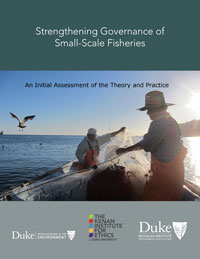Small-scale fisheries (SSFs), most of which are found in developing countries, have been poorly measured at a global level, and they have often been ignored in states’ policy making—yet estimates suggest their aggregate global contribution to nutrition, food security, and poverty eradication is massive. These fisheries face multiple conflicts over space and resources—conflicts that scholars now believe can be mitigated with interactive governance or ecosystem-based management. However, there is little consensus in the literature on how local conditions affect linkages between desired outcomes and different forms of governance in small-scale fisheries (i.e., there is no appropriate full-fledged framework to understand under what conditions a particular form of government will lead to sustainable or more equitable use of marine resources in one geographic region versus another). A diverse group of organizations provide support to small-scale fisheries governance, typically support for science and research, governance capacity building, bridging functions across different organizations and geographies, policy development, policy delivery, alternative livelihoods/compensation for reduced fishing, and technology innovations. The level of financing provided to support small-scale fisheries governance varies according to the financier, but worldwide is likely to be relatively small. Another challenge is achieving small-scale fisheries governance reform at a large spatial scale (e.g., at the scale of ecosystems or value chains). Through surveys and a global workshop, practitioners around the world were asked how they would approach this challenge. They recommended (1) building a new global research agenda to fill in knowledge gaps on small-scale fisheries and communities, (2) supporting agents of change by establishing a capacity building platform for small-scale fisheries to better organize, and (3) expanding direct support to SSF communities to govern in a manner consistent with sustainable management guidelines and with the support of state agencies where needed. These recommendations could inform a round of increased global support for small-scale fisheries as part of the movement to achieve the Sustainable Development Goals (SDGs). However, turning them into reality, and supporting SSF governance reform widely enough to make global progress toward the SDGs, will likely require much more capital—including more public aid and private investment.
 Issues & Projects
Issues & Projects

